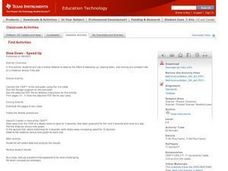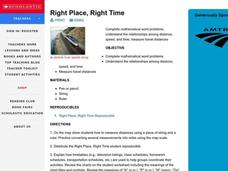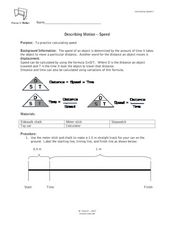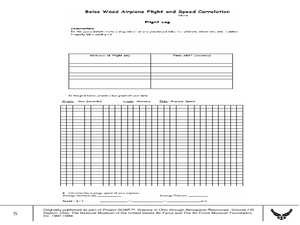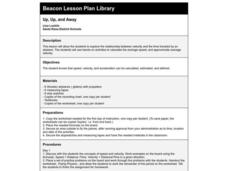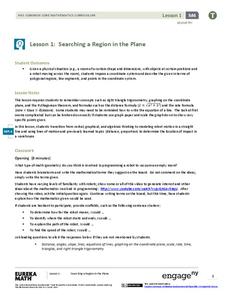Curated OER
Tracking Speed
Students calculate the speed of an object, by measuring the amount of time it takes to cover a given distance, and then divide: speed=distance/time. However, the object may not have been moving at a constant rate over the given distance....
Curated OER
Regents High School Examination - Physics 2010
Give every type of learner in your physics class an opportunity to demonstrate what they have learned throughout the year. From analyzing tables and graphs, to evaluating diagrams and solving problems, there is an outstanding variety of...
University of Colorado
Distance = Rate x Time
Every year, the moon moves 3.8 cm farther from Earth. In the 11th part of 22, classes use the distance formula. They determine the distance to the moon based upon given data and then graph Galileo spacecraft data to determine its movement.
Curated OER
Speed Score
A fast and fun way to practice shooting basketball. Small cooperative groups help each other tally up the most baskets made in a certain period of time. There are a couple ideas included to increase or decrease the difficulty of the...
Cornell University
Physics of Flight
Up, up, and away! Take your classes on a physics adventure. Learners explore the concepts important for flight. They experiment with the Bernoulli Principle while learning the forces that act on airplanes in flight.
Curated OER
Slow Down - Speed Up
Pupils explore the concept of distance and time as they use a CBR to mimic distance v. time graphs. Learners walk towards and away from the monitor to create various distance v. time graphs, then discuss what motion creates certain graphs.
Curated OER
What's Your Speed?
Learners explore the concept of distance v. time. They use a CBR to collect data on their distance over time, then plot their data using a scatter plot and find an equation to model their data. Pupils discuss what if scenarios which...
Curated OER
Motion: Speed, Velocity, Acceleration and Networking
Students interpret a variety of motion graphs. In this physics lesson, students calculate the speed and acceleration of objects using numerical data from graphs. They apply what they have learned to solve real world problems.
Curated OER
Physics and Me
Sixth graders compare and contrast mass and weight. In this physics lesson plan, 6th graders calculate speed given distance and time information. They construct a rocket and relate this to Newton's 3rd Law of motion.
Kenan Fellows
Analyzing Speed from Different Modalities
Show us your moves. Using sensor equipment, scholars track the motion of different movements, such as jogging, skipping, or jump roping. They analyze velocity and acceleration and create graphs representing each movement.
Curated OER
Wheeling It In!
Students use everyday materials (milk cartons, water bottles, pencils, straws, candy) to build a small-scale transportation device that incorporates the wheel and axle and the lever. They race their carts/trucks, measure distance, time...
Curated OER
Right Place, Right Time
Fourth graders complete mathematical word problems. They study the relationships among distance, speed, and time; and measure travel distances. They measure distances using a piece of string and a ruler and practice converting several...
Curated OER
Describing Motion-Speed
Students study speed and learn how to calculate it. In this investigative lesson students participate in an activity that shows them how to calculate speed then they fill out a worksheet.
Curated OER
Speed of Sound
Students examine the phenomenon of sounds traveling slower than light. They discover why they see things before they hear them and how to estimate the speed of sound as homework.
Curated OER
The Physics of the Planets: How 16th and 17th Century Physicist Helped Us Understand Our Solar System
Eighth graders draw the paths of the planets in the solar system. In this astronomy lesson, 8th graders calculate speed of objects using distance and time information. They research about the work of scientists in the 16th and 17th century.
Curated OER
Balsa Wood Airplane Flight and Speed Correlation
Ninth graders calculate the average speed of their balsa wood airplane. In this physics lesson, 9th graders build their own airplane and make necessary modifications to to make it fly straight. They interpret distance and time graph...
Curated OER
Speedy Trials
Fifth graders investigate how forces affect the motion of an object. In this physics lesson, 5th graders calculate an object's speed using a mathematical formula. They discuss how force and mass affects the speed.
Curated OER
Up, Up, and Away
Students study the concepts of speed and velocity and complete practice problems. In small groups, students fly airplanes and record time and distance traveled for each flight. They calculate the speed and velocity of their plane for...
Curated OER
So Fast! So Slow!
Fifth graders give examples of objects that move slow and fast. In this physics instructional activity, 5th graders rank animals according to how quickly they move. They create a bar graph of organisms versus rates of speed.
Curated OER
Acceleration, Drag, Gravity, Motion, Forces, and Friction
Eighth graders build and run mousetrap cars in order to measure distance, time, and mass for their cars. They use these measurements to calculate average speed and kinetic energy, then create a slide show to visually explain how the car...
Curated OER
Calculating Stride Length
How many steps does one take to walk a mile? The number of steps one walks in a mile would definitely depend on the length of his stride. Shorter people may take shorter strides, and taller people may take longer strides. This activity...
Curated OER
Race the Track! Super Slope (Lesson One)
Fifth graders utilize basic physics concepts to calculate speed of an object set in motion from various heights. In this basic physics lesson, 5th graders make observations, calculations, record data, and conclusions throughout experiment.
EngageNY
Searching a Region in the Plane
Programming a robot is a mathematical task! The activity asks learners to examine the process of programming a robot to vacuum a room. They use a coordinate plane to model the room, write equations to represent movement, determine the...
Curated OER
Squid Races
Students imitate squid propulsion using a balloon and experience Newton's third law: for every action there is an equal and opposite reaction. Various anatomical designs are tested and analyzed. They calculate the speed of each squid...





